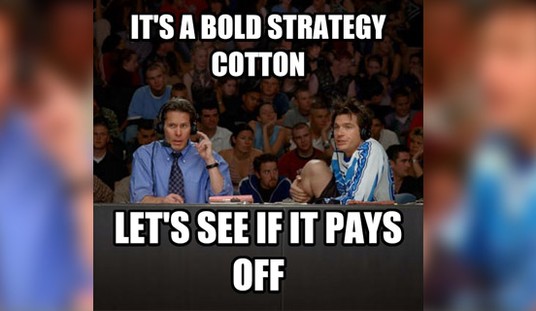And right on cue, New York Times columnist Paul Krugman says we should ignore the two-quarter rule that defines a recession:
Ignore the two-quarter rule. We might have a recession, but we aren't in one now https://t.co/48qpo9uoQL
— Paul Krugman (@paulkrugman) July 27, 2022
“ThAt’s NoT hOw rEcEssIons ArE dEfinEd,” he writes:
There’s a pretty good chance the Bureau of Economic Analysis, which produces the numbers on gross domestic product and other macroeconomic data, will declare on Thursday, preliminarily, that real G.D.P. shrank in the second quarter of 2022. Since it has already announced that real G.D.P. shrank in the first quarter, there will be a lot of breathless commentary to the effect that we’re officially in a recession.
But we won’t be. That’s not how recessions are defined; more important, it’s not how they should be defined. It’s possible that the people who actually decide whether we’re in a recession — more about them in a minute — will eventually declare that a recession began in the United States in the first half of this year, although that’s unlikely given other economic data. But they won’t base their decision solely on whether we’ve had two successive quarters of falling real G.D.P.
Does he ever get tired of being wrong?
— RNC Research (@RNCResearch) July 27, 2022
Anyway, we expect the two-quarter rule would be interpreted just a tiny bit differently if say the bad orange man were still in the Oval Office:
If we had exactly the same data and circumstances, but Trump was still POTUS, do you think the media would be saying this? https://t.co/VDWWuAAVsk
— Carol Roth (@caroljsroth) July 27, 2022
Recommended
This is their next rule, no doubt:
Ignore the two-quarter rule. Abide by the can't-say-recession-one-quarter-before-election rule. https://t.co/4o4SvEW9it
— NeverTweet (@LOLNeverTweet) July 27, 2022
It’s tiresome:
As with most things these days, there are two sets of rules.https://t.co/BadiF54jWI https://t.co/aZmMUhhRn4
— David Harsanyi (@davidharsanyi) July 27, 2022
And remember when the Dictionary used to dunk on takes like this? Good times, good times:
— LaurieAnn 🧚🏻♂️💫 (@mooshakins) July 27, 2022
What’s funny about all this is the two-quarter rule provides a benchmark so people can compare different periods based on some sort of shared metric. What happens when the data does show we’re in a recession? They’ll look even more foolish than they do now:
It's a big data week, for those who care about these things. (The rest of you should ignore this thread.) GDP on Thursday, which may show a second quarter of negative growth. But I don't care much about this, bc 2q of negative growth does NOT mean a recession 1/
— Paul Krugman (@paulkrugman) July 26, 2022
More about this in today's newsletter; but even aside from the 2-quarter rule being really bad, the main determinant of the economy's path forward will be how the Fed judges the inflation threat 2/
— Paul Krugman (@paulkrugman) July 26, 2022
So Friday will be a bigger day with releases of the PCE deflator and employment cost index, especially the latter. Will it confirm average wage data suggesting a cooling labor market? 3/
— Paul Krugman (@paulkrugman) July 26, 2022
Dallas Fed survey, just out, suggests that it might. via Daily Shot 4/ pic.twitter.com/nXT0oPv8Xu
— Paul Krugman (@paulkrugman) July 26, 2022
If so, we may be closer than people think to getting underlying inflation back on target. In which case the main recession risk will come not from intractable inflation but from Fed overshoot. 5/
— Paul Krugman (@paulkrugman) July 26, 2022
***
Related:
THERE it is! Biden seems to be setting the stage for who the WH will blame for a recession
Karine Jean-Pierre confirms the US is NOT in a recession or even anywhere near one
Biden economic adviser Brian Deese brought out to change the definition of ‘recession’ for the press
























Join the conversation as a VIP Member